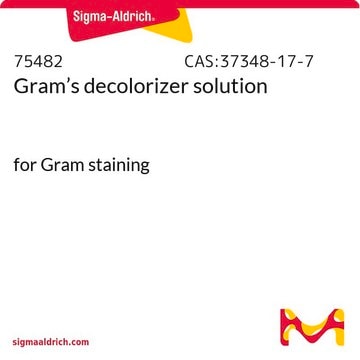Lead(II) acetate paper can be utilized to measure both gas and liquid. The paper can be directly placed in the liquid or a moistened paper (with distilled water) can be exposed to the gas. The time needed for the reaction depends on the sulfide concentration, but a color change will be visible within one minute at the latest.
1.09511
Lead(II)acetate paper
roll L 4.8 m, MQuant®
Synonym(s):
Lead(II)acetate paper chemical test strips, Lead(II)acetate paper test paper
About This Item
Recommended Products
description
semi-quantitative
Quality Level
product line
MQuant®
form
solid
specific analyte(s)
sulfide
packaging
pkg of 3 rolls
roll L
4.8 m
detection method
colorimetric
storage temp.
15-25°C
General description
Lead (II) acetate paper is used for the determination of sulfide and hydrogen sulfide. In contact with sulfide, it forms brownish black lead sulfide. This is a qualitative test paper, telling whether sulfide is in the sample or not. For a semiquantitative or quantitative result, please consider a test from our MQuant® or Spectroquant® portfolio.
Analysis Note
Legal Information
Signal Word
Danger
Hazard Statements
Precautionary Statements
Hazard Classifications
Aquatic Chronic 3 - Lact. - Repr. 1A - STOT RE 1
Target Organs
Central nervous system,Blood,Immune system,Kidney
Storage Class Code
6.1C - Combustible acute toxic Cat.3 / toxic compounds or compounds which causing chronic effects
WGK
WGK 3
Certificates of Analysis (COA)
Search for Certificates of Analysis (COA) by entering the products Lot/Batch Number. Lot and Batch Numbers can be found on a product’s label following the words ‘Lot’ or ‘Batch’.
Already Own This Product?
Find documentation for the products that you have recently purchased in the Document Library.
Customers Also Viewed
-
I need the using process of "1.09511.0003 Lead (II) acetate paper roll length 4.8m". For example: put the paper to contact the teste gas is enough or not. or I need to put it into the liquid?
1 answer-
Helpful?
-
Active Filters
Our team of scientists has experience in all areas of research including Life Science, Material Science, Chemical Synthesis, Chromatography, Analytical and many others.
Contact Technical Service












